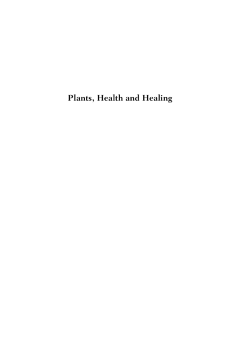
Additional Information
Book Details
Abstract
Plants have cultural histories, as their applications change over time and with place. Some plant species have affected human cultures in profound ways, such as the stimulants tea and coffee from the Old World, or coca and quinine from South America. Even though medicinal plants have always attracted considerable attention, there is surprisingly little research on the interface of ethnobotany and medical anthropology. This volume, which brings together (ethno-)botanists, medical anthropologists and a clinician, makes an important contribution towards filling this gap. It emphasises that plant knowledge arises situationally as an intrinsic part of social relationships, that herbs need to be enticed if not seduced by the healers who work with them, that herbal remedies are cultural artefacts, and that bioprospecting and medicinal plant discovery can be viewed as the epitome of a long history of borrowing, stealing and exchanging plants.
“This collection, the sixth in a renowned series in the epistemology of healing, explores how plant knowledge is incorporated into human social life. The collection is unique for its detailed attention to the botany and often pharmaceutical analysis of the plants combined in equal measures with contextualized observations about how these factors are culturally constructed both by laboratory scientists and local communities.” · Social Anthropology/Anthropologie sociale
“…the book offers a platform to raise thought-provoking questions and encourages in-depth analyses to bridge the gulf between ethnobotany and medical anthropology…Highly recommended.” · Choice
“This book, intended for lay audiences, provides a well illustrated portrait of several popular medicinal plant species and their societal interaction. The introduction provides a significant theoretical contribution towards the intersection of the fields of study surrounding medicinal plant utilization… [It] is an outstanding model of interdisciplinary scholarship and is a welcome contribution to our knowledge of the dynamic social construction of medicinal plant use. The diversity of perspectives included within the discussion of these phytotherapeutic remedies makes this an enticing work for those interested in ethnomedicines and the influences that direct their utilization.” · Anthropos
“The tantalising and rather eclectic selection of edited chapters takes the reader around the world following plants making their way into local pharmacopoeias, symbolic systems, myths and ways of coping with the unknowns of human illness. This book offers a much needed, concise edited volume on plants, health and healing. It brings together research in the disciplines of botany, biochemistry, clinical medicine, anthropology and history highlighting the contributions of multidisciplinary research to promote a more nuanced understanding of medicinal plant use.” · JRAI
“Finally, with this book a longstanding void in the literature has been filled! Although the uses of medicinal plants and their related cultural history have always attracted lay and scientific communities, until now there has been very little research done on the interface of ethnobotany and medical anthropology. The authors ((ethno-)botanists, medical anthropologists, clinician) link these disciplines with outstanding contributions by digging through historical aspects…and anthropological…and through plant portraits...A remarkable part of the book is the introduction to the book by E. Hsu where she explores the interface between the two disciplines in depth.” · Barbara Frei Haller, Université de Neuchâtel, Switzerland
Stephen Harris was awarded a Ph.D. in plant systematics from the University of St. Andrews in 1990. He has been the Druce Curator of Oxford University Herbaria since 1995 and has published over 50 peer-reviewed papers on genetics and systematics associated with the evolutionary consequences of plant-human interactions.
Elisabeth Hsu is Professor of Anthropology at the University of Oxford, where she has convened its master’s courses in medical anthropology since 2001. Based on her earlier studies in biology (botany), linguistics and sinology, she has published widely on the history and anthropology of Chinese medicine.
